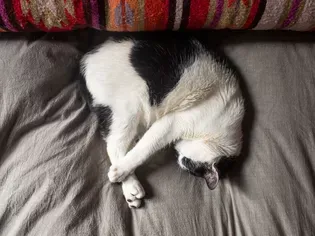Why Your Cat Sleeps So Much
Updated on 05/26/24

Unlocking the Secrets of Feline Slumber: Why Your Cat Sleeps So Much
In the tapestry of life, cats hold a unique place, their enigmatic nature woven into the threads of our daily existence. One of the most captivating aspects of feline behavior is their seemingly endless capacity for sleep, often leaving us wondering why our furry companions spend such a significant portion of their lives in the realm of slumber.
Unraveling the reasons behind a cat's penchant for sleep requires a multifaceted exploration, delving into the intricacies of their biology, evolutionary heritage, and the intricate bond they share with their human companions.
Biology and the Rhythms of Rest
Cats, like all living beings, are subject to the circadian rhythm, the internal clock that governs sleep-wake cycles. However, unlike humans who typically follow a monophasic sleep pattern (one extended period of sleep during the night), cats exhibit a polyphasic pattern characterized by multiple shorter sleep bouts throughout the day. This tendency stems from their evolutionary roots as nocturnal predators.
In the wild, cats conserve energy by sleeping during the day, reserving their peak activity for nocturnal hunting excursions. Their polyphasic sleep pattern allows for periodic arousal to monitor their surroundings for potential prey or danger. Even in domesticated settings, this instinctual behavior persists, explaining why cats often nap in short bursts throughout the day, even when their basic needs are met.
Digestion and the Dreamy Aftermath
The act of eating triggers a physiological response in cats that also contributes to their sleepiness. After a hearty meal, the digestive process diverts blood flow from other organs to the gastrointestinal tract, leading to a postprandial drowsiness. This phenomenon is particularly pronounced in cats, who spend a significant amount of time grooming after eating. The combination of digestion and grooming induces a state of contented relaxation, often resulting in a post-meal nap.
Energy Conservation: A Feline Strategy
Sleep serves as a vital energy conservation mechanism for cats, who expend considerable amounts of energy during their active periods. Whether engaging in playful antics, exploring their surroundings, or grooming themselves, cats rely on sleep to replenish their energy stores. By alternating between short bursts of activity and periods of rest, cats can maintain their optimal energy levels throughout the day.
Bonding and the Comfort of Companionship
Cats are social creatures, and their sleep patterns are often influenced by the presence of their human companions. When they feel secure and comfortable in their environment, they may choose to nap in close proximity to their owners. This behavior not only demonstrates trust but also reinforces the bond between cat and human.
Examples:
* A cat may curl up on its owner's lap while they read a book, seeking the warmth and comfort of their presence.
* Another cat may choose to snooze at the foot of its owner's bed, close enough to be within earshot and respond to any sounds or movements.
Signs of Excessive Sleepiness
While cats are known for their love of sleep, excessive sleepiness can be a sign of underlying health issues. If you notice a significant change in your cat's sleep patterns, especially if accompanied by other symptoms such as lethargy, loss of appetite, or difficulty breathing, it is important to consult with a veterinarian for a thorough examination.
Respecting Your Cat's Slumber
As responsible cat owners, it is essential to respect our feline companions' need for sleep. Providing them with a quiet and comfortable place to nap is crucial for their well-being. Avoid disturbing them while they sleep, as this can disrupt their circadian rhythm and lead to stress.
Conclusion
The enigmatic nature of cats extends to their sleep habits, a testament to their unique biology and evolutionary heritage. Understanding why your cat sleeps so much offers a deeper appreciation of their complex nature and the profound bond we share with these fascinating creatures. By respecting their need for slumber and creating a supportive environment, we can ensure their continued happiness and well-being.
Explore More Pets

Cat Behavior Problems
How to Stop Aggression in Kittens

Long-Haired Cat Breeds
Siberian Cat: Breed Profile, Characteristics, & Care

Cat Behavior Problems
How to Stop Kittens From Scratching and Biting

Long-Haired Cat Breeds
Turkish Angora: Cat Breed Profile, Characteristics & Care

Basic Training
How to Socialize Your Kitten

Short-Haired Cat Breeds
Cute Pictures & Facts About Calico Cats & Kittens

Litter Box Training
Training Your Kitten to Use the Litter Box

Long-Haired Cat Breeds
10 Fun Facts About White Cats
